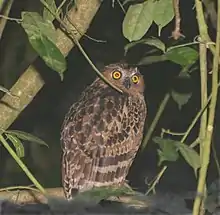| Ketupa | |
|---|---|
 | |
| Buffy fish owl | |
| Scientific classification | |
| Domain: | Eukaryota |
| Kingdom: | Animalia |
| Phylum: | Chordata |
| Class: | Aves |
| Order: | Strigiformes |
| Family: | Strigidae |
| Genus: | Ketupa Lesson, 1830 |
| Type species | |
| Ketupa javanensis[1] = Strix ketupa Lesson, 1830 | |
Ketupa is a genus of owls in the family Strigidae. The genus formerly contained just three species, the fish owls but based on the results from a genetic study published in 2020, the generic boundaries were altered. The genus now contains twelve species, nine of which were formerly placed in the genus Bubo.
Taxonomy
The genus Ketupa was introduced in 1830 by the French naturalist René Lesson for fish owl species from Java and India.[2] The type species is, by tautonymy, the buffy fish owl.[3] The genus name is derived from the Malay word Ketupok for the buffy fish owl.[4]
This genus formerly contained fewer species. A molecular phylogenetic study of the typical owl family (Strigidae) published in 2020 and another study published in 2021 found that the genera Ketupa and Scotopelia were embedded in the genus Bubo, rendering the genus paraphyletic. In a move to create monophyletic genera, nine species were moved from Bubo to Ketupa. Four of these species (shelleyi, coromandus, leucosticta, and philippinensis) had not been sampled in the genetic studies but were assumed to belong to Ketupa based on their morphological similarities to those species that had been sampled. Scotopelia (containing the fishing owls) was retained as a separate genus, although the genetic results suggested that the Scotopelia may be embedded within Ketupa.[5][6][7]
The genus now contains twelve species:[7]
- Fraser's eagle-owl, Ketupa poensis – formerly placed in Bubo
- Akun eagle-owl, Ketupa leucosticta – formerly placed in Bubo
- Verreaux's eagle-owl, Ketupa lactea – formerly placed in Bubo
- Shelley's eagle-owl, Ketupa shelleyi – formerly placed in Bubo
- Blakiston's fish owl, Ketupa blakistoni – formerly placed in Bubo
- Brown fish owl, Ketupa zeylonensis
- Tawny fish owl, Ketupa flavipes
- Buffy fish owl, Ketupa ketupu
- Barred eagle-owl, Ketupa sumatrana – formerly placed in Bubo
- Spot-bellied eagle-owl, Ketupa nipalensis – formerly placed in Bubo
- Dusky eagle-owl, Ketupa coromanda – formerly placed in Bubo
- Philippine eagle-owl, Ketupa philippensis – formerly placed in Bubo
References
- ↑ "Strigidae". aviansystematics.org. The Trust for Avian Systematics. Retrieved 2023-07-26.
- ↑ Lesson, René (1830). Traité d'Ornithologie, ou Tableau Méthodique (in French). Vol. 1. Paris: F.G. Levrault. p. 114 (livraison 2). Published in 8 livraisons between 1830 and 1831. For the publication date see: Dickinson, E.C.; Overstreet, L.K.; Dowsett, R.J.; Bruce, M.D. (2011). Priority! The Dating of Scientific Names in Ornithology: a Directory to the literature and its reviewers. Northampton, UK: Aves Press. p. 119. ISBN 978-0-9568611-1-5.
- ↑ Peters, James Lee, ed. (1940). Check-List of Birds of the World. Vol. 4. Cambridge, Massachusetts: Harvard University Press. p. 121.
- ↑ Jobling, James A. (2010). The Helm Dictionary of Scientific Bird Names. London: Christopher Helm. p. 214. ISBN 978-1-4081-2501-4.
- ↑ Salter, J.F.; Oliveros, C.H.; Hosner, P.A.; Manthey, J.D.; Robbins, M.B.; Moyle, R.G.; Brumfield, R.T.; Faircloth, B.C. (2020). "Extensive paraphyly in the typical owl family (Strigidae)". The Auk. 137 (ukz070). doi:10.1093/auk/ukz070. hdl:2346/93048.
- ↑ Wink, Michael; Sauer-Gürth, Heidi (2021). "Molecular taxonomy and systematics of owls (Strigiformes) - An update" (PDF). Airo. 29: 487–500.
- 1 2 Gill, Frank; Donsker, David; Rasmussen, Pamela, eds. (January 2023). "Owls". IOC World Bird List Version 13.1. International Ornithologists' Union. Retrieved 31 January 2022.
External links
![]() Media related to Ketupa at Wikimedia Commons
Media related to Ketupa at Wikimedia Commons